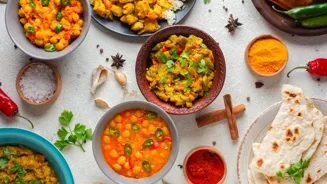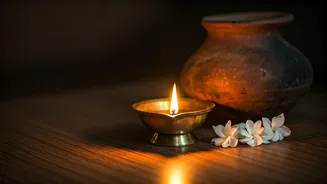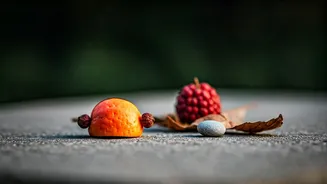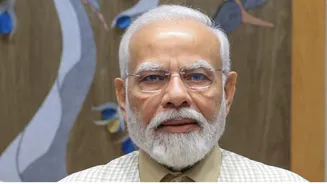Delve into the Cultural Essence of Indian Wedding Foods! Explore 10 traditional dishes symbolizing unity and prosperity
Indian weddings are grand celebrations, a vibrant tapestry woven with traditions,
rituals, and of course, delectable food. Food isn't just sustenance; it's an integral part of the wedding festivities, symbolizing prosperity, togetherness, and the blessings of the elders.
Across diverse regions and communities, specific dishes hold cultural significance, reflecting the unique culinary heritage of each. From the North's rich gravies to the South's tangy delights, every bite tells a story.
Let's explore 10 vegetarian dishes that are considered essential in Indian weddings, revealing their deeper meaning and cultural relevance. These dishes are not just about taste; they're about uniting families, celebrating heritage, and invoking good fortune for the newlywed couple.
The careful selection and preparation of these foods is often overseen by senior family members, ensuring that traditions are upheld and passed down to future generations. This also reinforces the importance of family bonds and the intergenerational sharing of knowledge and culinary expertise.
Pulao/Biryani (Vegetarian)
This fragrant rice dish, cooked with aromatic spices, vegetables, and sometimes dry fruits, symbolizes abundance and prosperity. The Basmati rice used is auspicious while cooking; it signifies a good beginning for the couple in their new life.
Pulao stands out because it is often served at the main wedding feast, welcoming everyone to share in the joy of the occasion. It is a wholesome meal in itself and can be customized with different vegetables and spices based on regional preferences.
Dal Makhani
Originating from the Punjab region, Dal Makhani is a creamy and comforting lentil dish, simmered overnight for a rich and smoky flavor. The black lentils are considered wholesome and satisfying, with their importance in providing strength and nourishment to the wedding guests.
This dish is often prepared with great care and attention, a symbol of the effort and love that goes into creating a lasting marriage. It is a good way to ensure that the gathered attendees, especially those who have traveled long distances, are comfortably fed.
Paneer Tikka Masala
Commonly served in North Indian weddings, Paneer Tikka Masala is a popular vegetable curry made from cottage cheese, cooked into a rich tomato-based gravy.
Paneer, being a dairy product from the buffalo in India, is often considered good luck & blessing from the gods, while the flavorful masala represents the joys and spices of married life.
The appealing color and rich texture of the dish add to the grandeur of the wedding feast, making it a favourite among guests. Its presence on the menu adds to the overall festive atmosphere.
Aloo Gobi
A simple yet flavorful dish of potatoes and cauliflower cooked with spices, Aloo Gobi represents the grounding and sustainability of a family. This dish, a staple in many Indian households, symbolizes the humble beginnings and strong foundation upon which a marriage is built.
Aloo Gobi is a reminder that even simple ingredients, when combined with love and care, can create something delicious and fulfilling. Its widespread appeal and familiarity make it a comforting addition to the wedding menu.
Dhokla
Originating from Gujarat, Dhokla is a fermented and steamed cake made from gram flour. Known for its light texture and sweet-sour taste. This spongy, savory snack is often served with chutney and represents the sweetness and tanginess of life's experiences.
Its light and digestible nature makes it a perfect choice for a wedding where the food is served for long hours. Dhokla often shows up in wedding menus in the states of Gujarat & Maharashtra.
Rasgulla and Gulab Jamun
These sweet, syrupy desserts are practically mandatory at Indian weddings. Rasgulla, made of chenna (Indian cheese) and soaked in sugar syrup, are considered auspicious to sweeten the relationship between the families.
Similarly, Gulab Jamun, deep-fried milk balls soaked in rose-flavored syrup, add a touch of luxury and celebration, signifying the abundance of good things to come in the couple's life.
Jalebi
This deep-fried, pretzel-shaped sweet, soaked in sugar syrup, adds excitement and zest to the festivities. With its distinctive shape and crispiness, jalebi represents the twists and turns of life, sweetened by love and togetherness.
Jalebi is often served hot, symbolising the warmth and passion that should characterise the marriage. Furthermore, Jalebi is also seen as representative of the complexities and celebrations in a marriage.
Ladoo
These spherical sweets, made from gram flour, semolina or other ingredients, are a staple in Indian celebrations. Known for their round shape, ladoos symbolize perfection and wholeness, representing the hope for a complete and prosperous married life.
Sharing ladoos symbolizes the sharing of joy and good fortune, strengthening the bonds between family and friends. Ladoos also symbolize good fortune and a happy beginning.
Kheer/Payasam
A creamy rice pudding, Kheer is made with milk, sugar, nuts, and cardamom. It embodies sweetness, prosperity, and the nourishing aspects of marriage. In South India, a similar dish called Payasam holds the same significance.
Kheer is a delicate and comforting dish, often prepared with great care and offered to the deities for blessings. Its creamy texture symbolizes the richness and smoothness of a successful marriage.
Dahi Vada: Soft lentil fritters immersed in creamy yogurt, topped with chutneys and spices, dahi vada offer a comforting and refreshing contrast to the richer dishes. Dahi, or yogurt, is considered auspicious in Hinduism, representing purity and auspiciousness. Dahi Vada symbolizes the smooth and harmonious blend of two families coming together. The layering of textures and flavors in Dahi Vada also represents the complexity and richness of relationships.
In conclusion, food in Indian weddings is far more than just sustenance; it is a powerful symbol of cultural identity, family unity, and blessings.
The dishes chosen for the wedding feast are not just a matter of taste but are deeply rooted in tradition and hold symbolic meanings that contribute to the overall significance of the occasion. By understanding the cultural significance of these dishes, we gain a deeper appreciation for the richness and diversity of Indian wedding traditions
AI Generated Content. Glance/InMobi shall have no liability for the content














